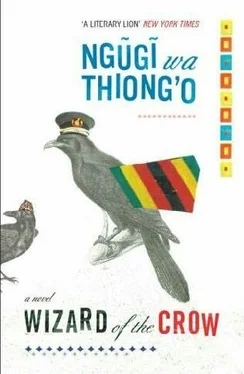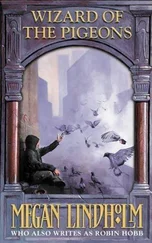“Is that why you were baptized, Kamltl Mr. Woods?” Tajirika said, laughing.
“My mother tells me that even when I was a child I showed a great interest in plants and in all living things.”
“By the way,” asked Tajirika, “in which language did you study this herbology of yours? Hindi?”
“No, no,” Kamltl hastened to answer. “To be honest with you, I did really want to know Hindi-it is the most widely spoken language in the country-but I didn’t get to know it very well because all our classes were in English. Just as here, a result of British rule. Besides Hindi, India has many languages: Gujarati, Bengali, Telugu, Urdu, Malayalam, and countless others. In Madras, where I went to college, the language is Tamil. I know a few mutterings of Tamil, such as Please show me the way to’ or Please give me some water’…”
“Begging for water! There, for the first time you have spoken an undeniable truth. I understand that in India beggars fill up the streets; some even have PhDs in the art of begging. It is understandable that you would pick up words to do with begging…”
“Ah… well… beggars… there are… in Aburiria,” Kamltl stuttered, a little confused.
“There are beggars in our streets, that’s true, but not as many as in India,” Tajirika said with a tone that suggested the conversation was coming to an end. “Now, young man. What did you say your name was? It looks to me as if you know more about history than about woods. Whatever I ask you, you give me a history lesson.”
Kamltl did not know whether to take this as compliment or mockery.
“One can only try” he responded vaguely.
“Good,” Tajirika said as he rose from the table. “You have tried your best in this interview. I like that. I wanted to make sure you are proficient in the English language before administering the real test. Follow me. I will conduct the test myself, to make sure you have understood everything.”
Kamltl felt joy leap within. I could tell that this man would not have asked me so many questions without his wanting to give me a chance. And that was all he ever asked for: a chance to show just what he was capable of doing with his hands and his mind. Now he clutched his bag even more firmly. This was truly his day. During all his years of job hunting, he had never had an interview that lasted more than a few minutes. How different this boss was from all those others who would not allow him to express his needs! This one had invested time in carefully probing Kamltl’s educational background. This was going to be his first real interview, and he was determined to do well by answering all the questions clearly, firmly, and completely. Even though it is said that one should not count one’s chickens before they are hatched, Kamltl could not help but count a few as he looked to the future. If I get this job… when I start my new job… and all at once he stopped counting. For instead of leading him into the inner office, Tajirika was walking out through the front door.
Even the secretary was baffled: where was Tajirika taking the young man? Being newly employed, she wondered whether he was taking the young man to an affiliated office of which she was unaware. Kamltl had a similar thought, keeping hope alive again: maybe Tajirika had already hired him and he was taking him elsewhere to start right away. Kamltl patted himself on the back. It was good that I gave him all those details about my education. It is good that I kept my cool and was detailed in my responses. Truly, patience is the gateway not only to knowledge but also to riches, or at least a job.
The secretary stood at the door to see what transpired. Her heart skipped a beat when she saw the two standing by the signboard at the road. Unfortunately, from where she stood she could not hear their conversation and so she focused on their gestures.
“You said you knew how to read and write in English,” Tajirika now said to Kamltl.
“Yes. Yes! One of my best subjects!” Kamltl replied in English. “Even today Madras University has maintained many English traditions. Officers of the British East India Company founded the town itself in 1639. One of the early governors of the region, Elihu Yale, or a name like that, is the one who later gave his fortune to found Yale University, one of the Ivy League schools in the States. So you see that…”
“We are not on the premises of the British East India Company; we are on those of Eldares Modern Construction and Beal Estate, and your Elihu Yale is not the governor. Here I am the boss, and my only interest in Yale is in Yale locks and keys. And another thing, young man: we are now at the beginning of a new millennium, the third millennium since Christ was born, and not in the middle of the last one. Or do you really mean to tell me that at Madras University they were teaching you seventeenth-century English?”
“Oh, no no!” KamTtT replied in English, thinking the man was still testing him with snares. “Modern English. The King and Queen’s English.”
“That’s good, because I will test you in modern English!”
“I am ready” KamTtT said, prepared to use every bit of English that he learned in AburTria and India and from books.
“It is simple. I want you to read loudly what is written on this signboard.”
Even before uttering the words on the board, KamTtT knew that Tajirika was toying with him. But the words came out of his mouth and he heard himself read loudly: No Vacancy: For Jobs Come Tomorrow.
“There! You have read it correctly!” Tajirika said triumphantly. “What is it that you don’t understand? Or do you need a Hindi interpreter? On these premises, there is no use for your herbology. Here are your Indian papers. Over there is the main avenue. And now you’ll excuse me, for I have an important engagement in Paradise.”
Even as he took back his papers, Kamltl could not believe what his eyes had seen and his ears heard. His tongue was lifeless in his mouth and his feet stuck to the ground. So he stood there, dumbfounded, not knowing whether to walk away, sit down, or continue standing. Only when Tajirika had moved several yards away did it dawn on Kamltl that everything he had seen and heard had indeed taken place. He did not know whether to run after the man and kick him in the butt or to beg the earth to swallow he himself. He felt like weeping but no tears came. Why had Tajirika set him up for this coup de grace?
He sat on the raised ground by the roadside. He felt that even the buildings facing him had witnessed his shame and, in their stony silence, pitied him. In the streets, motorcars and people on foot hurried past one another as if they all knew what they were doing and where they were going, while he did not know what to do with himself. He did not have a cent of fare for a matatu, a mkokoteni, mbon-dambonda, or any other human-drawn carriage. But even if he had money, where would he tell them to take him?
Has someone cast an evil spell on me, or am I under a family curse? The question startled him. He did not believe in curses and evil charms; he believed in science. But what had just passed for a job interview defied the logic of science. And just at that moment, as if to add an exclamation point to the exercise, Tajirika passed by in a chauffeur-driven car.
How far up the ladder of education had Tajirika climbed, Kamrö wondered? Or was it business that had educated him to be a heartless interviewer of needy job seekers? Kamltl had often given serious thought to starting a business. With his BA and MBA, he surely had the necessary educational background, but starting a business required capital and land. Even with abundant fishes in the sea, one still needed a net or a line and hook, at least.
Читать дальше












